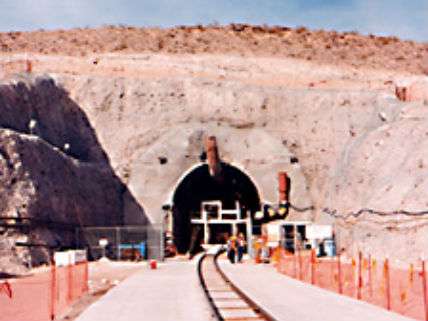Trump Administration Is Right: Open the Yucca Mountain Nuclear Waste Repository
Some 70,000 metric tons to nuclear waste is still sitting at nuclear power plants

U.S. Department of Energy Secretary Rick Perry visited the mothballed Yucca Mountain Nuclear Waste Repository site in Nevada on Monday. Earlier this month, Texas Attorney General by Ken Paxton filed a lawsuit U.S. 5th Circuit Court of Appeals asserting that federal government violated the law in failing to complete the licensing process for permanent storage of nuclear waste at Yucca Mountain. President Donald Trump's proposed budget allocates $120 million to restart the licensing process for the facility.
In 1982 Congress committed to finding a permanent site to handle the nuclear waste produced by America's nuclear power plants. In 1987, Congress designated Yucca Mountain as that site and something like $15 billion has been spent on readying it since it was selected. In 2002, the final environmental impact statement concluded that nuclear waste could be safely stored there for at least 10,000 years. The final supplemental environmental impact statement in 2008 came to the same conclusion. When it comes to highly politicized topics, nothing is ever really final final about decisions made by federal bureaucracies. So in 2010, President Barack Obama directed the DOE to close the facility as a favor to Nevada's Sen. Harry Reid.
Despite the Obama administration's attempt to kill the project, in 2013 the U.S. District Court of Appeals in Washington ordered the Nuclear Regulatory Commission (NRC) to resume its review of the license application for Yucca Mountain. The court observed that the agency "is simply defying a law enacted by Congress, and the Commission is doing so without any legal basis." In May 2016, the NRC finally issued its assessment that noted:
This supplement evaluates the potential radiological and nonradiological impacts—over a one million year period—on the aquifer environment, soils, ecology, and public health, as well as the potential for disproportionate impacts on minority or low-income populations. In addition, this supplement assesses the potential for cumulative impacts associated with other past, present, or reasonably foreseeable future actions. The NRC staff finds that each of the potential direct, indirect, and cumulative impacts on the resources evaluated in this supplement would be SMALL.
The Nuclear Waste Policy Act of 1982 requires nuclear power plant operators to pay a tenth of a cent per kilowatt-hour to the government in return for the DOE taking responsibility for spent nuclear fuel. As of 2014 when the Obama administration stopped collecting the fees, the power plants had paid $31 billion to the government to take care of their waste. Some 70,000 metric tons of nuclear waste is still sitting at their plants.
It's well past time to start the process of opening up Yucca Mountain.


Show Comments (23)